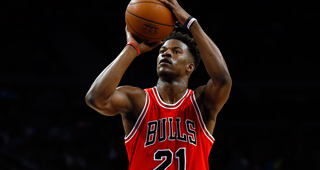It’s difficult to calculate what percentage of Rajon Rondo’s mental energy is spent concerning himself with what Jimmy Butler thinks of him. It’s likely somewhere between zero percent and “Which one’s Jimmy Butler, again?”
Until the rest of the world agrees with Rondo that he is indeed still a top-tier NBA talent, he’s going to have little interest in the credentials we bestow upon anyone else in the NBA. Rondo didn’t have much time for Rick Carlisle’s championship knowledge. He challenged us to name a handful of his Sacramento King teammates. And when Butler and Dwyane Wade tried to call out the young Bulls, Rondo basically told them, “I knew Kevin Garnett, I played with Kevin Garnett, and you gentlemen are no Kevin Garnett.”
Rondo isn’t trying to prove anything to Jimmy Butler. He is putting forth a bigger effort to match the bigger stage of the playoffs, because that is very much something that Rajon Rondo would do. Like Rondo, Wade too is exercising playoff muscles he’s flexed countless times before. We spent an entire season talking about the Bulls as a poorly constructed and dysfunctional team. We didn’t much notice that they had an element of a bizarre win-now team. And now (like, literally right this moment), they’re winning.
The most frustrating thing about Rondo not having played defense for about three years is that he was always capable of it. It’s a little bit unfair. A player as quick, athletic, and intelligent as Rondo can be an effective defensive player, which is one reason the Bulls have given the Celtics so much trouble in their first two games. Forcing Isaiah Thomas to have to contend with alternating doses of a focused Rondo and Butler is the epitome of cutting off the head of the snake.
No longer are we seeing Rondo lazily let his man drive by him so he can blindly attempt to poke the ball out from behind. This was not only a comically low-percentage strategy, but it compromised the entire defense. Swap that out for what we used to call “National TV Rondo” and it's a semi-drastic improvement to your team.
To be fair, while I could go on treating this like a much-needed increase in effort, another way to frame Rondo and Wade’s early playoff contributions is as veteran savvy. Neither of these players looked like they did in 2010 this year because it’s not 2010. A certain level of conservation is necessary to bring out glimpses of those players. Consistent production is such an important part of NBA success that we forget that what late-stage career Wade can offer a team is quite valuable in the playoffs: He still knows how to score in the most select moments that his team needs him to.
The rest of the Bulls are really good shooters or rebounders with low ceilings but few glaring weaknesses. Butler is a superstar who plays like one every single night. When Wade is reminding defenders that he was once arguably the best second-option scorer in NBA history, and Rondo’s effort turns stat hunting into legitimate contributions, then all of a sudden the Bulls have the familiar formula of playmakers and formidable role players.
And yet still, this wasn’t just one elaborate ruse of the regular season. Of course, the fans and front office in Chicago are hoping to appease Butler, who has been doing the heavy lifting for his franchise, but the players around Butler aren’t playing to win his favor. And that’s not because Butler isn’t worth it or can’t lead a team. It isn’t because the Bulls are all selfish. It’s because there’s a ceiling and a floor to this team.
The Bulls are stepping up in the playoffs, but this isn’t the 2011 Mavericks trying to help Dirk Nowitzki reach the pinnacle, or even what we’re seeing with this year’s Rockets playing off James Harden.
Much like Paul George in Indiana, Butler is going to continue to take stock in where his franchise is headed. Unlike George, Butler has three more years on his contract, and the team’s future isn’t very clear.
When people disparage the “middle ground of the NBA” (teams not good enough to be in contention and not bad enough to get a top draft pick) they are often doing so through the lens of the draft as the most valuable resource to improvement. What is often overlooked is how those two ends of the spectrum (contention and total rebuild) are compatible to the human nature of competitive synergy. Building a foundation and scaling a mountain are both tasks that tie players together.
In the NBA, playing on a mediocre team instills a certain level of self-interest. Everyone is trying to do what’s best for them, and there’s not really anything wrong with that. Some are trying to prove they still belong in the league. Some are young players trying to develop at a reasonable pace. Some are trying to get their next contract. Or in Wade’s case, trying to build upon a legacy.
Sometimes those self-interests can produce an effect for the greater good of the team. That feels like what we’re seeing with Chicago. The Bulls need Wade to rip Boston’s heart out in the fourth quarter. That doesn’t mean he’s rallying for Jimmy the same way he once did for Lebron.
Does that even matter? Who knows?
The result of all this is something that we didn’t really have much reason to expect all season: Jimmy Butler is leading the Bulls, and everyone else is falling in line. For now, it’s working.



